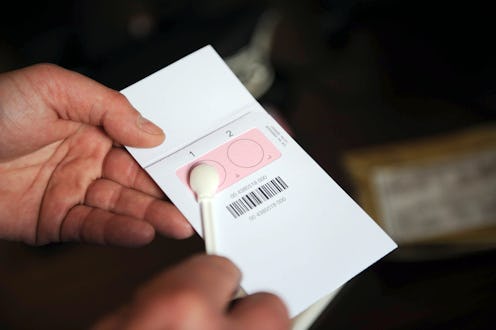Life
How Far Do You Have Travel For A Rape Kit?
You could spend an eternity listing out the ways our criminal justice system fails sexual assault survivors, but if you want to add one more item to the list, here goes. It turns out many rural women who need rape kits have to drive over an hour just to get one. Which is horrifying just to think about — as if we didn't have enough problems with how rape kits are handled in this country.
Rape kits are a key part of collecting evidence in a sexual assault case, and often are essential in obtaining a conviction of the alleged perpetrator. Following an alleged sexual assault, a medical examiner will collect physical evidence from an alleged victim, including body swabs and documentation of any injuries, using the materials in a rape kit, and then store the evidence in the kit for safekeeping. An alleged victim does not have to formally report the assault in order to request a rape kit, but should they choose to come forward later, the kit ensures that the evidence, including DNA samples, is preserved. But unfortunately, none of that can happen if there is no medical examiner capable of collecting evidence in your area — and that is a disturbingly common problem.
According to a new report, many women in rural areas lack local access to rape kits, which often effectively means no access at all. The study looked at six states — Colorado, Florida, Massachusetts, Nebraska, Oregon, and Wisconsin — and found that none had a sufficient number of medical examiners to cover the need for sexual assault exams, and that the problem was worse in rural areas.
In both Wisconsin and Nebraska, for instance, nearly half of all countries had no medical examiners capable of administering a rape kit. Not a single one. In Colorado, only one medical center, Memorial Hospital in Colorado Springs, offered staff examiners 24 hours a day, seven days a week, and patients who lived in the mountains faced extra challenges if there wasn't an examiner in their immediate area.
"If you’re in the mountains in the winter, and you’re told you have to go somewhere else, that can be a big barrier,” Katherine Iritani, who led the study, told Washington Post. “Some victims never get tested.”
Indeed, it's hard to imagine there aren't quite a lot of women who wind up never getting tested because of the need to drive long distances in order to find someone to perform the exam. After all, the aftermath of an assault can be disorienting and traumatic; it's not the sort of headspace that leaves people wanting to drive up to an hour to another part of the state in order to be examined by a stranger. Indeed, it can be difficult enough for someone to work up the courage to go to a local hospital and request a kit. And that's even assuming that a person has the means to transport themselves that far. To say nothing of the fact that victims are advised not to eat or drink between the assault and the exam in order to preserve evidence.
How many women and men have looked at the drive to the nearest medical examiner and simply felt like they couldn't do it? How many have turned around on the long drive, convinced it wasn't worth it or just too much? How many haven't even had the option of making the drive because they don't have a car, or can't afford the gas money, or don't have reliable public transport to and from their destination?
We will probably never know the true number, but we can work to fix the problem. There are already numerous programs in place trying to train new medical examiners capable of administering exams, which is a start. But clearly we need to start making sure there are plenty of programs focused on training examiners in rural communities. Because no person should be denied justice based on where they live.
Image: Giphy
